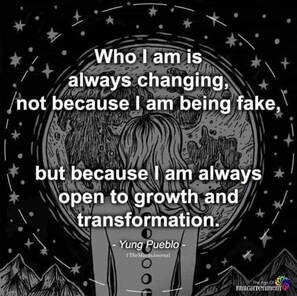|
Have you ever noticed that people like to pigeonhole you? I guess it makes sense; we are most comfortable with what is familiar. No, maybe that’s not strong enough: We are terrified of the unfamiliar.
Pretty innocuous examples, right? But they point to a pattern. I spent three nights in Hong Kong. I am not proud to admit that the scents of the city – of street food cooking – literally had me gagging. The first night we ate in the hotel restaurant, the second day we had pizza for lunch, and the last night we went to Ruby Tuesdays. And that from a woman who embraces new experiences more than most. I couldn’t get past my fear of “what if?” Side bar: Did you know that the fear of throwing up in public is a real thing? Emetophobia. It is actually at the root of many people’s anxiety. Wow, I really never know where these blogs will end up! I just ramble. Admittedly, throwing up in public would be a new experience, but I’m fairly certain that wasn’t what I intended when I spoke of being scared of the unfamiliar. Maybe there is a way to tie these together… Vomiting publicly is only one way that we can embarrass or humiliate ourselves, right? I have fallen up the stairs in front of the coordinators’ morning coffee meeting at one of the seniors’ residences I was working out of. Twice. I once shouted, “Crap, she’s back!” while friends and I were trying to stealthily escape a spoken word event. I literally fell on my face at a high school dance and took three stitches to the chin. I’m sure you’ve had similar experiences – you’ve pushed on a door that says “Pull,” you’ve tripped over a crack in the sidewalk, or you’ve tried to make chocolate swirl ice cream at the Ponderosa only to realise that you were loosening the bolts, which caused ice cream to pour out from behind the front plate… Hey, these things happen. It’s the meaning that we give to these events that matters.
Events which should be viewed with humour – at least after the fact – can go to a whole new level when we internalise. Compare:
We all do clumsy, rude, dumb, and embarrassing things. I would suggest that if you claim not to, you are in a huge battle with perfectionism and its dear friend, anxiety. That combination probably keeps you really set in your ways. You only know one route to get to any destination and lose your mind when there’s a detour. You don’t try new foods because, “Hey, I like vanilla,” then complain, “I’m sure that was French vanilla. I wanted regular.” You can travel but will usually stay in American chain hotels, preferably ones that include an American breakfast. And that’s fine, and it’s safe, and we are hardwired to do just that. Again, those examples are pretty benign, but imagine the consequences for those people. Bear in mind that emotional pain – of which shame is the strongest – hurts as much or more than physical pain. A woman hits a detour. Her level of anxiety starts to climb. She has internalised a belief that she has a terrible sense of direction. She thinks she’s running parallel to her planned route, but somehow the streets diverged, and she finds herself lost and beside herself by this point. Thoughts of, “You’re so stupid!” and “Why is everything always so difficult?” run through her head, informing and perpetuating her views of herself and the world. You know she’s probably had that running patter in her mind since she was a child. It makes her less likely to ask for the help she needs, which just escalates her spiral. Vanilla ice cream. I’m imagining a little boy faced with too many choices in his young life, maybe just standing in the ice cream parlour, eyes wide. Thirty-one flavours!! I envision his parents getting annoyed. “Just pick one!” So, he points to some random container and walks back home, letting a lot of his ice cream drip down his little hand and spitting coconut shards on the ground as his parents shame-lecture him about waste. Speaking of waste, what if a Canadian traveller is faced with an unfamiliar toilet? That can lead to high-magnitude stress. Many Southeast Asian countries use water rather than toilet paper for cleansing. You often need a coin to open the door of a public toilet in the UK. The French toilet is often a hole in the floor. Not knowing how to use the bathroom can lead to more thoughts of shame, maybe even dredge up the person’s own experience of potty training. Vomit. Potty training. This could be my best blog ever! I believe my point was best penned by Thich Nhat Hanh. “People have a hard time letting go of their suffering. Out of a fear of the unknown, they prefer suffering that is familiar.” How heart-wrenching is that? People would rather suffer than change; that’s how terrifying the unfamiliar is. Because we don’t want to embarrass ourselves. Because of those shaming voices in our heads. The great news is that going outside of your comfort zone is a muscle that can be developed simply by doing it. By fighting our primitive urge to stay safe, we open ourselves up to not just new behaviours and interests. We also rewire our thought patterns.
Don’t let your kids watch you suffer and do nothing about it. Resilience is the path away from shame. What do you want your legacy to be? Here’s me, feeling all cocky, like I’ve mastered this whole shame thing, right? I got complacent. I started believing that I had risen above it all, and then yesterday hit. Being on my way home from work first, I offered to pick up the cat food that we needed. I got to Petland, made a beeline for the back of the store, picked out the bag, took a second mortgage out on the house to be able to afford it, and headed home. Tra la la. It was the wrong food. They hadn’t been eating that one for a few bags now. If the language I used was foul, you should have seen my temper! I grew irate in a way I haven’t in months, at least. While my wife was off replacing the bag, I dove in deep trying to understand my reaction. What I realised was that I am OK when I do something stupid as long as I’m the only one impacted, but when it affects someone else, it would seem, I lose my... waste. The shaming voices come back with a vengeance. “You’re such an idiot. Couldn’t even manage the simplest task. What is the matter with you?” Yesterday was a humbling reminder that the work is never finished. The changes I have been making in the direction of my business have been confusing to quite a few people. “But it’s still about the dying, right?” To that I say a resounding, “Yes, but not necessarily at the end of life.” Oddly, that doesn’t seem to allay their confusion. “Could you explain this legacy coaching thing to me again? Like, who do you work with?” *deep breath* “I work with people whose legacy is at the forefront of their minds – couples who’re trying to get pregnant, new grandparents, and the dying, mostly. We focus on what sort of non-material legacy they want to leave their loved ones. And healing the things they don’t want to pass down.” Here’s what it comes down to in a nutshell: I help people make peace with their lives, their relationships, and themselves, so they can enjoy the rest of their existence in peace, however many years that happens to be. When a person is dying, it is simply their last best time to accomplish this. Leave the world better.
0 Comments
Leave a Reply. |
Christie MordenMental Health Coach Archives
March 2022
|

